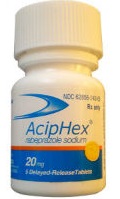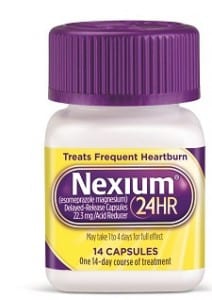 Proton pump inhibitor lawsuits are being filed for people who developed kidney problems after taking popular PPI drugs like Nexium, Protonix, Prilosec, Prevacid, and Aciphex. The lawsuits were spurred largely by a study published in 2016 which showed a link between PPIs and chronic kidney disease.
Proton pump inhibitor lawsuits are being filed for people who developed kidney problems after taking popular PPI drugs like Nexium, Protonix, Prilosec, Prevacid, and Aciphex. The lawsuits were spurred largely by a study published in 2016 which showed a link between PPIs and chronic kidney disease.Chronic kidney disease can lead to kidney failure, requiring regular dialysis and possibly a kidney transplant.
In the latest study, researchers used data on self-reported proton pump inhibitor use among more than 10,000 people taking part in a national study on hardening of the arteries. Researchers also evaluated data on outpatient PPI prescriptions among nearly 250,000 patients of a Pennsylvania health care system.
The study noted PPI users in both groups were more likely to have health problems, such as obesity, high blood pressure and heart issues.
 In both groups, researchers associated use of the drugs with an increased risk of chronic kidney disease over ten years.
In both groups, researchers associated use of the drugs with an increased risk of chronic kidney disease over ten years.The researchers also compared people using the drugs once a day with those who used them twice daily. They found the latter linked with a 46 percent increased risk of chronic kidney disease, compared with a 15 percent increased risk in the once-daily users.
No one is sure how PPI drugs might damage the kidneys, though two theories lead the way. One is that PPIs can cause magnesium levels to decline; a lack of magnesium can damage kidneys. The second theory is that kidneys might suffer damage if patients face repeated bouts of acute kidney inflammation from proton pump inhibitors.
Gastroenterologists are also cautious about using PPIs because they’ve been tied to other health problems such as bone fractures, infections of C. difficile, and pneumonia.
Because many people who take PPIs have other health problems, lawsuits against the makers of these drugs could be difficult to pursue, though several law firms are pursuing them, including Matthews & Associates. Meanwhile, many makers of proton pump inhibitor drugs have already paid out millions of dollars in lawsuits related to these dubious drugs. PPI lawsuit settlements reveal that these drugs have a checkered history:
PPI Lawsuit Settlements
 2012 – $55 million: Pfizer agreed to settlement with U.S. government for promoting Protonix for unapproved uses.
2012 – $55 million: Pfizer agreed to settlement with U.S. government for promoting Protonix for unapproved uses.
2014 – Undisclosed amount: Takeda Pharmaceuticals settled a lawsuit claiming Prevacid was responsible for bone fractures.
2015 – $20 million: AstraZeneca agreed to a settlement in a consumer class action lawsuit over its marketing of Prilosec and Nexium.
2015 – $7.9 million: AstraZeneca agreed to settlement with U.S. government over alleged kickback scheme involving Nexium.
2015 – $24 million: Generic drug maker Teva Pharmaceuticals settled lawsuit claiming it took money from AstraZeneca to keep generic Nexium off the market.
Free Legal Case Evaluation
Our law firm is handling proton pump inhibitor lawsuits in which someone took a PPI and developed chronic kidney disease. Contact us for a free legal consultation if you have been diagnosed with kidney problems following use of PPI drugs.
 Related
Related
- Prilosec Lawsuit
- Protonix Kidney Disease Lawsuit
- Proton Pump Inhibitor Lawsuit
- Prevacid Kidney Failure Lawsuit
- Aciphex Lawsuit Lawyer
- Nexium Lawsuit

by Matthews & Associates




